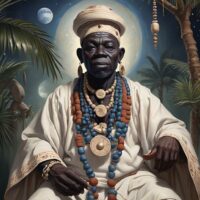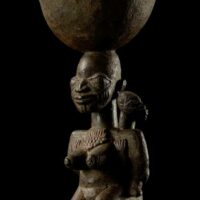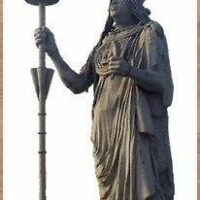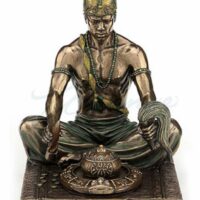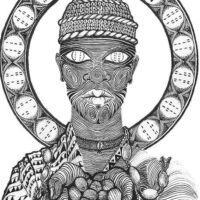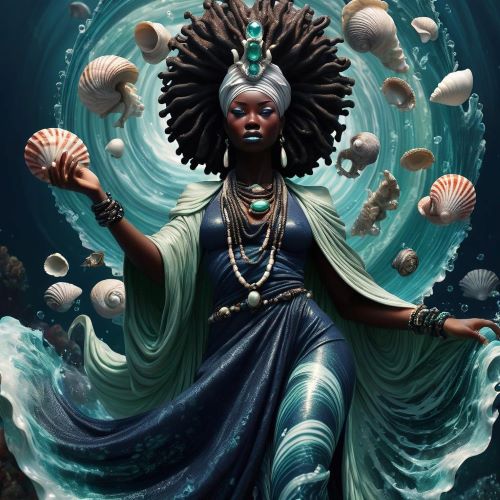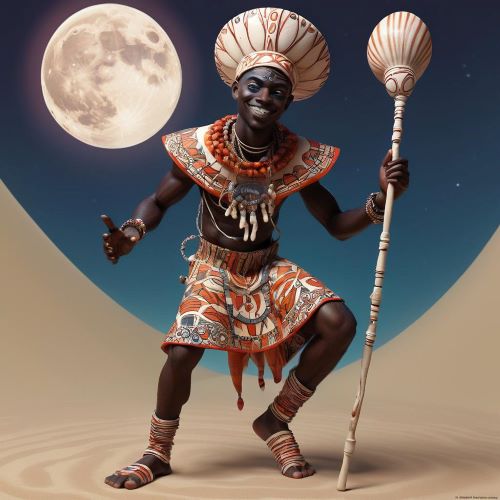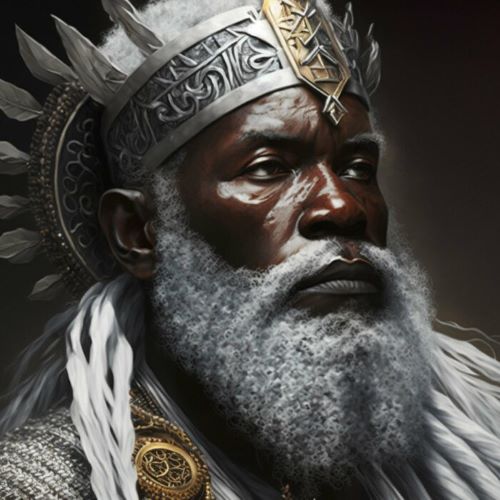Orunmila : God of Destiny
Listen
At a glance
| Description | |
|---|---|
| Origin | Yoruba Mythology |
| Classification | Gods |
| Family Members | Olodumare (Father), Shango, Ogun (Siblings), Aje, Obatala (Wives) |
| Region | Nigeria |
| Associated With | Destiny |
Orunmila
Introduction
Orunmila, a pivotal figure in Yoruba mythology, is the Orisha of wisdom, knowledge, and divination. As the custodian of Ifa, the vast oral tradition of Yoruba knowledge, he serves as a divine guide, offering insights into fate, destiny, and the pursuit of balance. His influence extends beyond religion, shaping Yoruba culture, ethics, and social practices.
Also known as Orunla or Ifa, Orunmila is regarded as the creator of Ifa and the Babalawo tradition, embodying the roles of sage, counselor, and teacher. His name, meaning “heaven knows our salvation,” reflects his deep understanding of destiny and his ability to help individuals fulfill their purpose. Having witnessed the creation of the universe, he is believed to know the fate of all beings, making him a central figure in Yoruba spirituality.
Orunmila’s importance lies in his role as the guardian of Ifa, a responsibility granted by Olodumare, the Supreme God. As a divine messenger, he interprets fate and provides guidance on matters such as personal growth, relationships, and societal harmony. His teachings remain central to the Ifa religion, which continues to thrive in West Africa, Latin America, and beyond.
Physical Traits
Orunmila’s physical representations are rich in symbolism, reflecting his wisdom and spiritual authority. He is often depicted as an elderly sage, signifying his vast knowledge and deep understanding of destiny. His attire, typically green and yellow, symbolizes his connection to nature, divination, and enlightenment. Some portrayals emphasize his age with a long white beard, reinforcing his status as a custodian of ancient wisdom.
Another common depiction presents Orunmila as “the little man with the big head,” a metaphor for his boundless intelligence and divine insight. This imagery highlights his extraordinary mental capacity, setting him apart as a being of superior wisdom.
In Yoruba art, Orunmila is frequently shown holding an Opon Ifá (divination board) and Ikin (sacred palm nuts), tools essential to the Ifá divination system. These elements underscore his role as the master of fate and the intermediary between the divine and human realms. Regardless of artistic variations, his depictions consistently reinforce his identity as a revered guide and source of enlightenment.
Family
Orunmila’s family ties in Yoruba mythology are complex and deeply interwoven with the broader pantheon of Orishas. He is often regarded as a direct emanation of Olodumare, the Supreme God, and a sibling to powerful deities such as Ogun, the Orisha of iron and war, and Shango, the god of thunder and lightning. These connections emphasize his integral role in maintaining cosmic order and guiding humanity.
His marital relationships further highlight his influence over different aspects of life. Orunmila is sometimes linked to Aje, the goddess of wealth, signifying his connection to prosperity, and Orishanla (Obatala), the deity of purity and creation, reinforcing his role in shaping destiny. His union with Osun, who is credited with teaching him divination, underscores the importance of feminine wisdom in his practice.
Orunmila is also described as having eight children, whom he taught the sacred art of Ifá divination in a mythical land called Aido Inle. His familial bonds extend to Osanyin, the Orisha of herbal medicine, illustrating the link between wisdom and healing. Some traditions name his parents as Alayeru and Oroko, while others attribute his lineage to Jakuta, a stone mason, and Alajeru, a collector of sacrifices. These variations in ancestry reflect the diverse oral traditions within Yoruba spirituality. Regardless of the differing accounts, Orunmila’s relationships reinforce his profound impact on Yoruba cosmology, influencing divination, morality, and human destiny.
Other names
Orunmila is known by numerous names and titles, each representing different facets of his divine nature and influence. One of his prominent epithets is Ela, symbolizing purity and sanctity, reinforcing his role as a divine guide. In the Afro-Cuban Lukumí tradition, he is referred to as Orunla, reflecting his continued worship in Yoruba-derived religious practices across the diaspora.
His association with divination is encapsulated in the name Ifá, often used interchangeably with his own, as he is the master of the Ifá divination system. He is also called Agbonniregun, meaning “one who brings honor and prosperity,” highlighting his role in guiding individuals toward wisdom and success. Another significant title, Eleri Ipin or “witness to fate,” underscores his knowledge of destiny and his ability to help people align with their preordained paths.
In some traditions, Orunmila is honored as Igbákejì Olódùmarè, meaning “second in command to Olodumare,” emphasizing his elevated status among the Orishas. In Latin America, the name Orula is commonly used, reflecting his widespread veneration beyond West Africa. These names and titles illustrate the profound respect for Orunmila’s wisdom and the essential role he plays in guiding humanity across different cultures and traditions.
Powers and Abilities
Orunmila is known by numerous names and titles, each representing different facets of his divine nature and influence. One of his prominent epithets is Ela, symbolizing purity and sanctity, reinforcing his role as a divine guide. In the Afro-Cuban Lukumí tradition, he is referred to as Orunla, reflecting his continued worship in Yoruba-derived religious practices across the diaspora.
His association with divination is encapsulated in the name Ifá, often used interchangeably with his own, as he is the master of the Ifá divination system. He is also called Agbonniregun, meaning “one who brings honor and prosperity,” highlighting his role in guiding individuals toward wisdom and success. Another significant title, Eleri Ipin or “witness to fate,” underscores his knowledge of destiny and his ability to help people align with their preordained paths.
In some traditions, Orunmila is honored as Igbákejì Olódùmarè, meaning “second in command to Olodumare,” emphasizing his elevated status among the Orishas. In Latin America, the name Orula is commonly used, reflecting his widespread veneration beyond West Africa. These names and titles illustrate the profound respect for Orunmila’s wisdom and the essential role he plays in guiding humanity across different cultures and traditions.
Modern Day Influence
Orunmila’s influence extends well beyond ancient Yoruba society, shaping contemporary religious, cultural, and intellectual traditions. In Nigeria and across West Africa, he remains a central figure in spiritual life, with Babalawos (priests of Ifá) continuing to provide divination, guidance, and wisdom to individuals and communities. The Ifá system, with its 256 Odu Ifá, remains an essential aspect of Yoruba religious practice, offering insights into destiny, morality, and personal growth.
Beyond Africa, Orunmila’s worship spread to the Americas and the Caribbean through the transatlantic slave trade. In Cuba, he is honored as Orunla within Santería (Lukumí), while in Brazil, he plays a significant role in Candomblé and Umbanda. His teachings have adapted to different cultural landscapes, merging with other traditions while preserving their core emphasis on wisdom and divination.
His legacy is also reflected in modern literature, music, and art, where themes of destiny, self-discovery, and wisdom resonate with contemporary audiences. Figures such as Dr. Ajayi Crowther and Chief Obafemi Awolowo have drawn inspiration from his ideals, applying his insights to leadership and social progress. Orunmila continues to be a guiding force for those seeking clarity and stability, demonstrating the timeless relevance of his teachings in an ever-changing world.
Related Images
Source
Abimbola, W. (1997). Ifá: An Exposition of Ifá Literary Corpus. Lagos: Athelia Henrietta Press.
Drewal, H. J., Pemberton, J., & Abiodun, R. (1989). Yoruba: Nine Centuries of African Art and Thought. New York: Harry N. Abrams.
Murphy, J. M., & Sanford, M. (2001). Osun Across the Waters: A Yoruba Goddess in Africa and the Americas. Bloomington: Indiana University Press.
Olupona, J. K. (1991). Kingship, Religion, and Rituals in a Nigerian Community: A Phenomenological Study of Ondo Yoruba Festivals. Stockholm: Almqvist & Wiksell.
Thompson, R. F. (1983). Flash of the Spirit: African & Afro-American Art & Philosophy. New York: Vintage Books.
Bascom, W. R. (1969). Ifa Divination: Communication Between Gods and Men in West Africa. Bloomington: Indiana University Press.
websites:
(n.d.). Retrieved from
(n.d.). Retrieved from
Frequently Asked Questions
What is lorem Ipsum?
I am text block. Click edit button to change this text. Lorem ipsum dolor sit amet, consectetur adipiscing elit. Ut elit tellus, luctus nec ullamcorper mattis, pulvinar dapibus leo.
What is lorem Ipsum?
I am text block. Click edit button to change this text. Lorem ipsum dolor sit amet, consectetur adipiscing elit. Ut elit tellus, luctus nec ullamcorper mattis, pulvinar dapibus leo.
What is lorem Ipsum?
I am text block. Click edit button to change this text. Lorem ipsum dolor sit amet, consectetur adipiscing elit. Ut elit tellus, luctus nec ullamcorper mattis, pulvinar dapibus leo.
What is lorem Ipsum?
I am text block. Click edit button to change this text. Lorem ipsum dolor sit amet, consectetur adipiscing elit. Ut elit tellus, luctus nec ullamcorper mattis, pulvinar dapibus leo.
What is lorem Ipsum?
I am text block. Click edit button to change this text. Lorem ipsum dolor sit amet, consectetur adipiscing elit. Ut elit tellus, luctus nec ullamcorper mattis, pulvinar dapibus leo.

